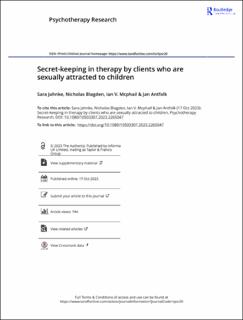Secret-keeping in therapy by clients who are sexually attracted to children
Journal article, Peer reviewed
Published version

Åpne
Permanent lenke
https://hdl.handle.net/11250/3123565Utgivelsesdato
2023Metadata
Vis full innførselSamlinger
Sammendrag
Objective This study investigated the reasons why pedohebephilic clients disclose their sexual attraction to children in therapy and the experiences associated with this decision among English-speaking samples. Method: The pre-registered online survey combined (1) quantitative correlational data of self-reported improvement, alliance, therapist reaction to disclosure, and the belief that mandatory reporting laws were in place, and (2) qualitative data about reasons for disclosure or no disclosure as well as perceived consequences. The sample consisted of pedohebephilic people who have been clients in therapy and have disclosed (n = 96) or not disclosed (n = 40). Results: While the disclosure and no disclosure groups did not differ in improvement or beliefs about mandatory reporting, those who had disclosed reported a stronger alliance. Clients who did not perceive the therapist’s reaction as supportive reported less improvement than the no disclosure group. Thematic analysis of qualitative data identified three themes concerning motives for disclosing or not disclosing and a fourth regarding differential impacts of disclosure. Discussion: This study indicates that disclosing pedohebephilia does not in and of itself lead to improvement but is contingent on a therapist’s reaction.
